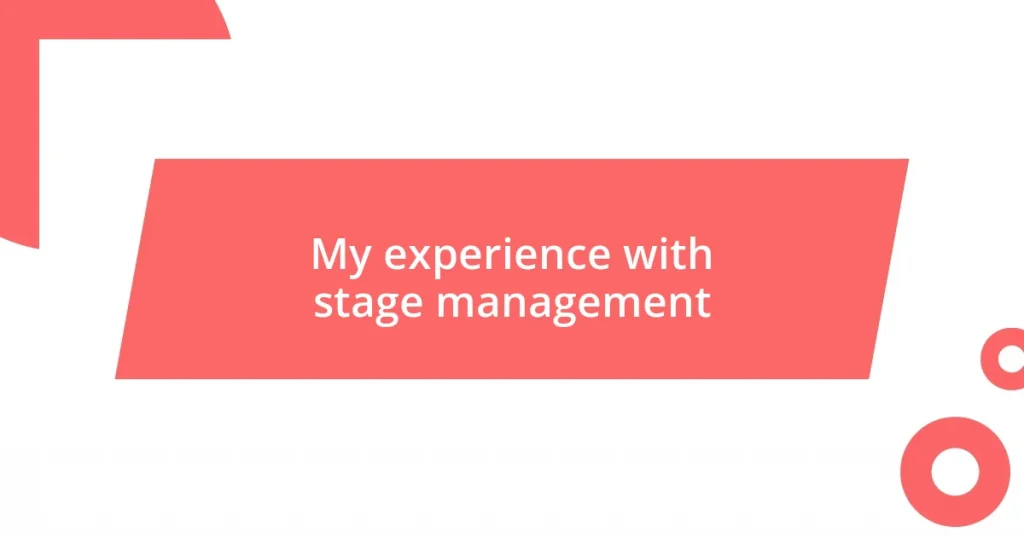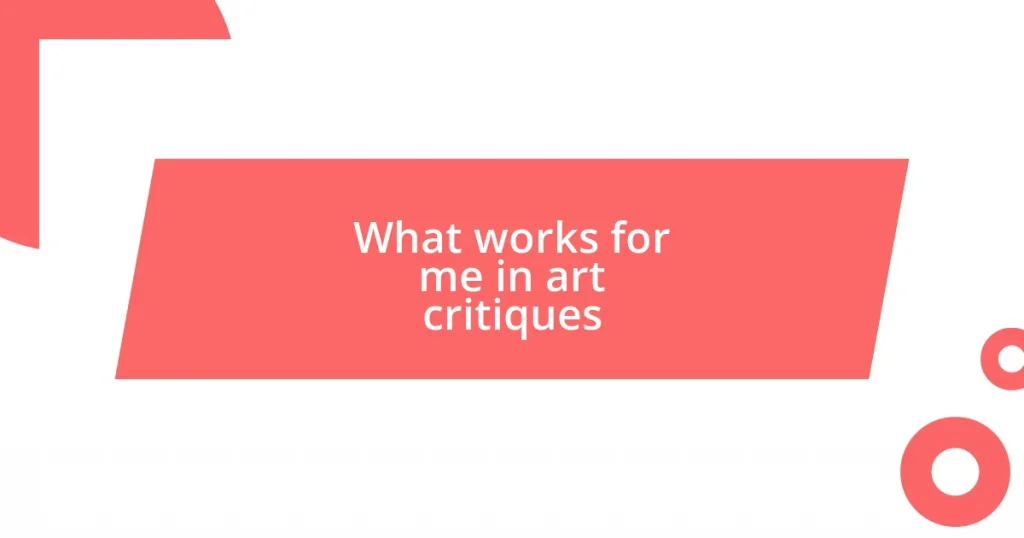Key takeaways:
- Stage management is crucial for facilitating communication and coordination among cast and crew, ensuring a smooth production process.
- Essential skills for stage managers include effective communication, organization, and strong problem-solving abilities, especially in high-pressure situations.
- Building relationships, adaptability, and prioritizing self-care are vital lessons that enhance the effectiveness and resilience of a stage manager.
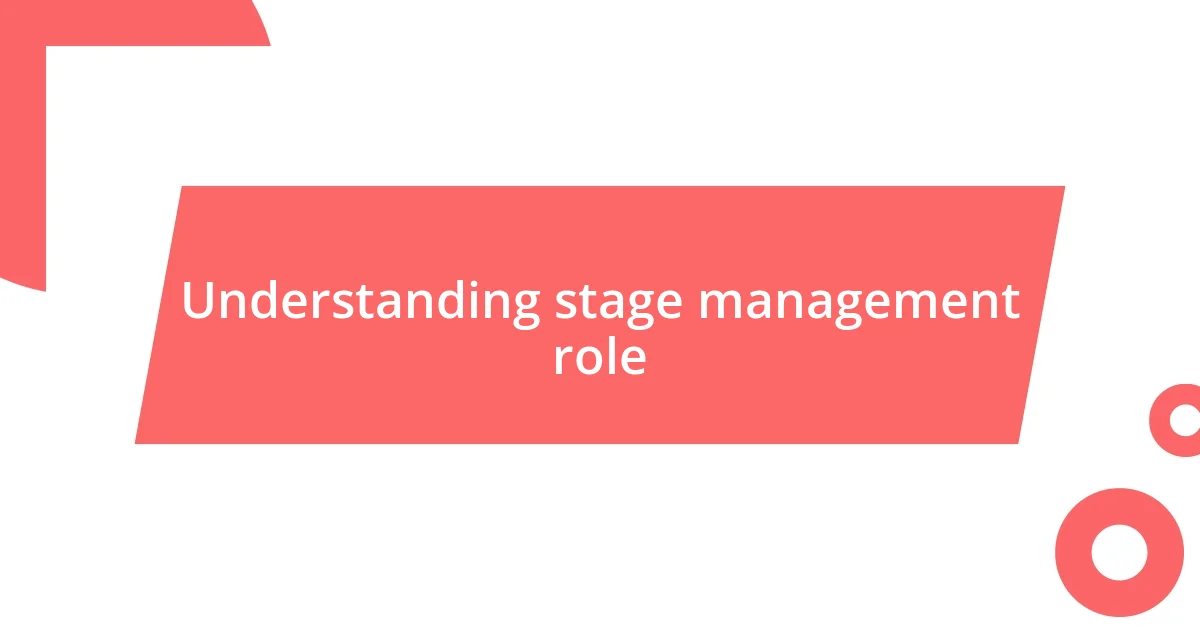
Understanding stage management role
Stage management is truly the backbone of any production, though many may not fully appreciate its significance. I remember stepping onto a chaotic set for the first time, feeling the adrenaline rush as I coordinated not just the actors, but also the crew and tech elements. Have you ever wondered how a show runs smoothly, even when it feels like it’s on the brink of chaos? That’s the magic of stage management.
A stage manager ensures that everyone is on the same page, from rehearsals all the way to opening night. I had a moment during a dress rehearsal when a crucial prop went missing. My heart raced, but I quickly improvised, guiding a crew member to grab a nearby alternative while keeping the actors focused and calm. It’s in those high-pressure moments that the adrenaline fuels my passion for this role.
But beyond logistics, stage management is about fostering a collaborative atmosphere. I’ve found that building relationships with the cast and crew can transform the entire creative process. The next time you see a seamless performance, consider the countless hours and emotional investment a stage manager dedicates to make that moment happen. How rewarding it is to know you played a pivotal role in telling someone else’s story!
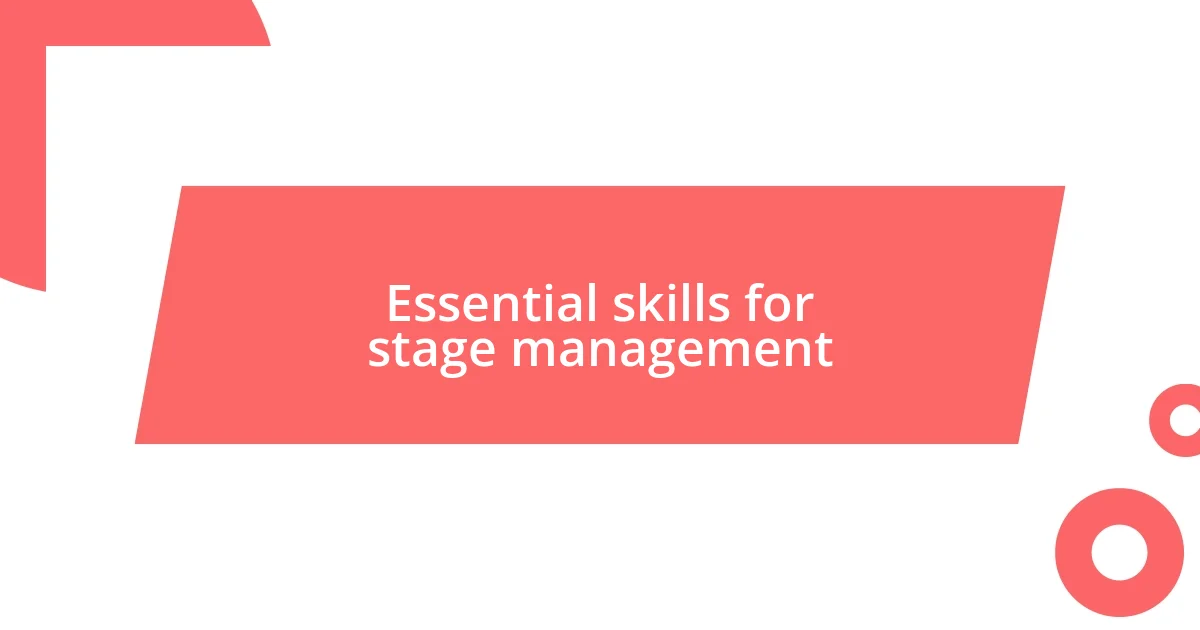
Essential skills for stage management
Managing a stage requires an array of vital skills that can make or break a production. Communication is at the top of that list. I recall a time when a last-minute change in the script necessitated a quick update in cueing. I instantly gathered the cast for a huddle, ensuring everyone was informed and on the same wavelength. This swift communication not only reduced confusion but also fostered trust among the team.
Another key skill is organization. I remember meticulously creating a detailed timeline for an entire production schedule. Balancing rehearsal times, tech setups, and actor availability can feel like juggling flaming torches! But, this preparation allows for smoother operations, minimizing hiccups on show day. In my experience, having everything organized brings a peace of mind that lets creativity flourish.
Problem-solving is equally essential. There was a night when a sound cue failed right before a pivotal scene. Instead of panicking, I quickly instructed the stagehand to activate a backup sound system. This quick thinking saved the moment, demonstrating how important it is to remain calm and focused under pressure. It’s these experiences that refine your instincts and enhance your skill set.
| Skill | Description |
|---|---|
| Communication | Clear interaction fosters team cohesion and understanding of changes. |
| Organization | Maintaining a structured timeline ensures smooth operations. |
| Problem-solving | Quick thinking assists in managing unforeseen issues during performances. |
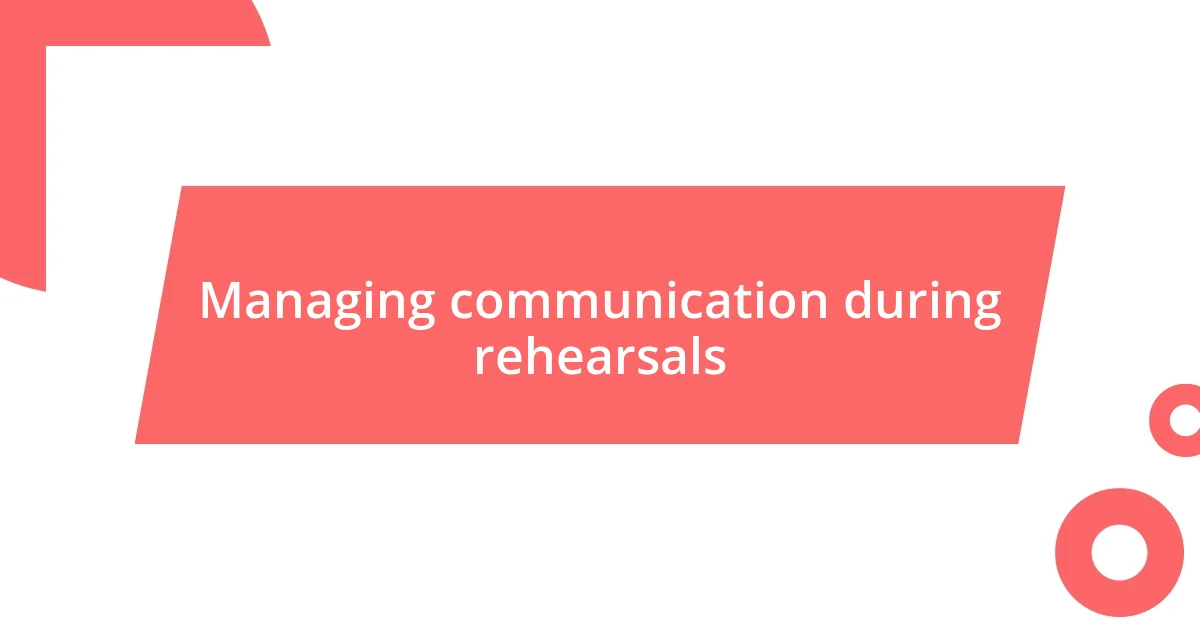
Managing communication during rehearsals
Managing communication during rehearsals is crucial for creating a productive environment. I remember one rehearsal when I noticed some confusion among the actors regarding blocking changes. To tackle this, I decided to implement brief, targeted check-ins before each run-through. By creating a space where everyone could ask questions or voice concerns, we transformed the atmosphere from uncertain to confident. This shift not only improved the flow of the rehearsal but also strengthened trust within the team.
Here are some key strategies that I’ve found effective for managing communication during rehearsals:
- Clear Instructions: Provide concise directions to avoid misunderstandings.
- Regular Feedback: Encourage an open dialogue where cast and crew can share thoughts on what’s working and what isn’t.
- Visual Aids: Use diagrams or notes to clarify complex movements or transitions.
- Scheduled Updates: Have dedicated times during rehearsal to address any changes or new information.
- Encourage Team Spirit: Foster a supportive environment where everyone feels comfortable communicating.
These practices helped me build an atmosphere of collaboration, ensuring that everyone was on the same page. It’s about making space for voices to be heard, which ultimately leads to a more cohesive and polished performance come showtime.

Strategies for effective problem solving
When it comes to effective problem-solving, I’ve learned that being proactive is key. I recall a time when we faced a sudden shortage of props just hours before a performance. Instead of waiting for issues to arise, I took the initiative to assess our inventory beforehand. This experience taught me that anticipating potential obstacles can prevent larger problems down the line, allowing the team to focus on delivering a great show.
Another strategy is collaboration. In one production, a last-minute actor change put us in a tight spot. Thankfully, I suggested a brainstorming session with the crew to quickly address the lack of familiarity with the new cast member. This cooperative approach not only helped us devise solutions but also created a united front. Have you ever felt the energy of a group rallying together? It’s undeniably powerful and uplifting during the chaos of live theater.
Finally, I believe in learning from every experience. After a particularly challenging opening night where several things went awry, I initiated a post-mortem discussion with the team. We reflected on the evening’s events, identifying what went wrong and how we could improve for the future. This practice helped foster an environment of growth and resilience. To me, embracing these lessons transforms setbacks into stepping stones—don’t you think that every stumble holds the potential for something greater?

Lessons learned from my experiences
Throughout my experiences in stage management, one vital lesson I’ve learned is the importance of adaptability. I vividly recall a performance where the lead actor fell ill hours before the show. Instead of panicking, I quickly shuffled the rehearsal schedule to allow the understudy time to prepare. This unexpected challenge taught me to remain calm and think on my feet. How often have you found yourself in a situation where flexibility makes all the difference? It’s a skill that can truly turn a potential disaster into a success.
Another significant lesson is the value of building strong relationships within the team. I remember a time when our lighting designer and I faced miscommunication regarding cues. Instead of letting it fester, I invited them for coffee to discuss our perspectives and clarify expectations. Over that casual chat, we discovered mutual frustrations and solutions together, which not only resolved our issues but also strengthened our collaboration. Have you ever thought about how a simple conversation can bridge gaps and foster cooperation? It’s something that remains invaluable in the whirlwind of production schedules.
Finally, I’ve realized that self-care is foundational in this high-pressure role. I once pushed myself too hard during a particularly busy production week, neglecting my own well-being. I found myself exhausted and less effective. This experience highlighted the necessity of balancing passion with personal health. Taking a moment to breathe and check in with myself makes me a better stage manager. How can we serve others if we’re running on empty? Prioritizing self-care has not only improved my performance but also set a positive example for my team.










